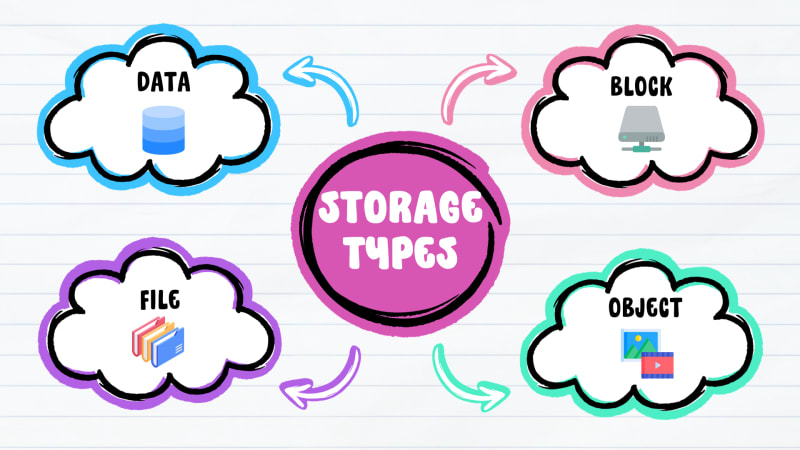In our ever-connected, data-driven world, storage lies at the heart of our digital existence. The way we store, manage, and access our data can make a world of difference, both for individuals and organizations. There's no one-size-fits-all solution, as the landscape of storage is as diverse as the data itself. From structured to unstructured, from files and blocks to objects and more, each storage type plays a unique role in the realm of information management.
In this blog, we will explore the storage universe, its various types, and their vital roles in our data-driven lives.
1. File Storage:
Description: File storage is a traditional method of storing data, where files are organized into directories and folders. It allows multiple users or applications to access and share files simultaneously.
AWS: Amazon Elastic File System (EFS) is an AWS service that provides scalable and fully managed file storage, making it easy to set up and share files across multiple EC2 instances. It's well-suited for use cases like content management systems and shared application data.
Alibaba Cloud: Alibaba Cloud Network Attached Storage (NAS) offers fully managed file storage that can be accessed by multiple ECS instances, providing a shared file system for applications.
Google Cloud: Google Cloud Filestore is a managed file storage service designed for enterprise workloads. It allows you to create NFS file shares that can be mounted by multiple virtual machines.
Microsoft Azure: Microsoft Azure File Storage provides fully managed file shares that can be accessed by multiple virtual machines. It is a scalable and reliable solution for file storage in the cloud.
2. Block Storage:
Description: Block storage involves dividing data into fixed-sized blocks and is typically used for more structured, low-level data storage. It is suitable for applications requiring high-speed data transfer and low-latency access.
AWS: Amazon Elastic Block Store (EBS) is a block storage service that allows you to attach persistent block storage volumes to EC2 instances. It's commonly used for hosting databases, running applications, and storing critical data that requires high performance and reliability.
Alibaba Cloud: Alibaba Cloud Elastic Block Storage (EBS) offers high-performance block storage that can be attached to Elastic Compute Service (ECS) instances, suitable for applications that require low-latency and high-speed storage.
Google Cloud: Google Cloud Persistent Disks provide block storage for virtual machine instances. They can be used with Compute Engine instances and offer features like snapshots and auto-resizing.
Microsoft Azure: Microsoft Azure Disk Storage provides block storage that can be attached to Azure virtual machines. Azure Managed Disks simplify disk management, offering high availability and scalability.
3. Object Storage:
Description: Object storage is a data storage architecture that manages data as objects, each with its own unique identifier, metadata, and data. It is well-suited for unstructured data and large-scale storage needs.
AWS: Amazon Simple Storage Service (S3) is a prime example of object storage. AWS S3 allows you to store and retrieve data as objects in buckets. It's suitable for various use cases, including data backups, web hosting, multimedia storage, and data archiving.
Alibaba Cloud: Alibaba Cloud Object Storage Service (OSS) is a highly scalable object storage solution designed for the storage and retrieval of unstructured data, such as images, videos, and backups.
Google Cloud: Google Cloud Storage is a versatile object storage service for storing and retrieving objects of any size. It's commonly used for hosting media files, data backups, and serving static website content.
Microsoft Azure: Microsoft Azure Blob Storage is an object storage service that can store and manage unstructured data. It is suitable for a wide range of use cases, including data archiving, content delivery, and IoT data storage.
4. Data Storage:
Description: Data storage refers to the broader category of storing and managing structured or unstructured data. It encompasses various storage types and is essential for data management and analysis.
Structured Data:
AWS: Amazon Relational Database Service (RDS) is an AWS service that provides managed relational databases, suitable for structured data storage and management.
Alibaba Cloud: ApsaraDB for RDS (Relational Database Service) offers a highly reliable and scalable SQL database service. It's the go-to choice for hosting structured data, such as transaction records, customer information, and financial data, and supports popular relational database engines like MySQL, PostgreSQL, and SQL Server.
Google Cloud: Cloud SQL is a fully managed SQL database service that facilitates the storage and retrieval of structured data. It's suitable for managing structured data like customer records, inventory data, and business applications using popular SQL database engines.
Microsoft Azure: SQL Database is a fully managed SQL database service designed for structured data storage and processing. It provides a robust platform for hosting relational data, making it a great choice for applications that rely on SQL databases for structured data management.
Unstructured Data:
AWS: Amazon DynamoDB is an AWS service that offers a highly scalable, NoSQL database for unstructured or semi-structured data storage. It is ideal for applications that require flexible and fast storage and retrieval of unstructured data, such as JSON documents and key-value pairs.
Alibaba Cloud: Table Store is a NoSQL database service suitable for managing unstructured or semi-structured data. It's an excellent choice for applications dealing with non-relational data types, such as JSON documents and key-value pairs.
Google Cloud: Firestore is a NoSQL database designed for managing semi-structured and unstructured data. It's well-suited for handling documents, JSON data, and other non-relational data types.
Azure: Cosmos DB is Microsoft's globally distributed, multi-model database service that supports NoSQL data storage. It offers a flexible and scalable solution for managing unstructured and semi-structured data, making it ideal for a wide range of applications.




Top comments (1)
For a cheat sheet pictorial view of services visit Alex Xu post
https://www.linkedin.com/posts/alexxubyte_systemdesign-coding-interviewtips-activity-7122609870771499009-hvkX?utm_source=share&utm_medium=member_desktop